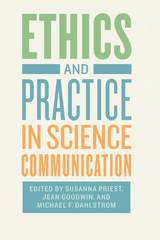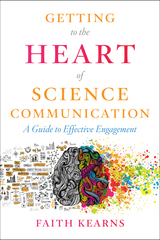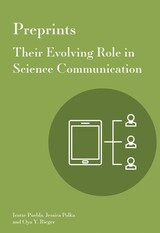3 books about Science Communication

Ethics and Practice in Science Communication
Edited by Susanna Priest, Jean Goodwin, and Michael F. Dahlstrom
University of Chicago Press, 2018
From climate to vaccination, stem-cell research to evolution, scientific work is often the subject of public controversies in which scientists and science communicators find themselves enmeshed. Especially with such hot-button topics, science communication plays vital roles. Gathering together the work of a multidisciplinary, international collection of scholars, the editors of Ethics and Practice in Science Communication present an enlightening dialogue involving these communities, one that articulates the often differing objectives and ethical responsibilities communicators face in bringing a range of scientific knowledge to the wider world.
In three sections—how ethics matters, professional practice, and case studies—contributors to this volume explore the many complex questions surrounding the communication of scientific results to nonscientists. Has the science been shared clearly and accurately? Have questions of risk, uncertainty, and appropriate representation been adequately addressed? And, most fundamentally, what is the purpose of communicating science to the public: Is it to inform and empower? Or to persuade—to influence behavior and policy? By inspiring scientists and science communicators alike to think more deeply about their work, this book reaffirms that the integrity of the communication of science is vital to a healthy relationship between science and society today.
In three sections—how ethics matters, professional practice, and case studies—contributors to this volume explore the many complex questions surrounding the communication of scientific results to nonscientists. Has the science been shared clearly and accurately? Have questions of risk, uncertainty, and appropriate representation been adequately addressed? And, most fundamentally, what is the purpose of communicating science to the public: Is it to inform and empower? Or to persuade—to influence behavior and policy? By inspiring scientists and science communicators alike to think more deeply about their work, this book reaffirms that the integrity of the communication of science is vital to a healthy relationship between science and society today.
[more]

Getting to the Heart of Science Communication
A Guide to Effective Engagement
Faith Kearns
Island Press, 2021
At a community fire day in a northern California town several years ago, author Faith Kearns gave a talk on building fire-safe houses able to withstand increasingly common wildfires. Much to her surprise, Kearns was confronted by an audience member whose house had recently burned. What she thought was straightforward, helpful scientific information had instead retraumatized audience members, forcing Kearns to reevaluate her approach. Like Kearns, scientists today working on controversial issues from climate change to drought to COVID-19 are finding themselves more often in the middle of deeply traumatizing or polarized conflicts. It is no longer enough for scientists to communicate a scientific topic clearly. They must not only be experts in their fields of study, but also experts in navigating the thoughts, feelings, and opinions of members of the public they engage with, and with each other. And the conversations are growing more fraught.
In Getting to the Heart of Science Communication, Faith Kearns has penned a succinct guide for navigating the human relationships critical to the success of practice-based science. Using interviews and personal anecdotes, as well as her own insights as a field scientist, Kearns walks readers through the evolution of science communication and how emotional and high-stakes issues have shaped communication. The meat of the book lies in the middle chapters, where Kearns offers key tools for communicators: listening, working with conflict, and understanding trauma, loss, and healing. She concludes the book with a substantive discussion on diversity, equity, and inclusion in science communication, and advice to readers for handling their own emotional needs in an unpredictable career landscape.
This meticulously researched volume takes science communication to the next level, helping scientists see the value of listening as well as talking, understanding power dynamics in relationships, and addressing the roles of trauma, loss, grief, and healing. This book will particularly resonate with early to mid-career scientists, graduate students, and researchers, especially those in applied sciences who work closely with the public.
In Getting to the Heart of Science Communication, Faith Kearns has penned a succinct guide for navigating the human relationships critical to the success of practice-based science. Using interviews and personal anecdotes, as well as her own insights as a field scientist, Kearns walks readers through the evolution of science communication and how emotional and high-stakes issues have shaped communication. The meat of the book lies in the middle chapters, where Kearns offers key tools for communicators: listening, working with conflict, and understanding trauma, loss, and healing. She concludes the book with a substantive discussion on diversity, equity, and inclusion in science communication, and advice to readers for handling their own emotional needs in an unpredictable career landscape.
This meticulously researched volume takes science communication to the next level, helping scientists see the value of listening as well as talking, understanding power dynamics in relationships, and addressing the roles of trauma, loss, grief, and healing. This book will particularly resonate with early to mid-career scientists, graduate students, and researchers, especially those in applied sciences who work closely with the public.
[more]

Preprints
Their Evolving Role in Science Communication
Iratxe Puebla
Against the Grain, LLC, 2022
This briefing discusses the history and role of preprints in the biological sciences within the evolving open science landscape. The focus is on the explosive growth of preprints as a publishing model and the associated challenges of maintaining technical infrastructure and establishing sustainable business models. A preprint is a scholarly manuscript posted by the author(s) to a repository or platform to facilitate open and broad sharing of early work without any limitations to access. Currently there are more than 60 preprint servers representing different subject and geographical domains, each one evolving at a different based on adoption patterns and disciplinary ethos. This briefing will offer invaluable help to those who wish to understand this rapidly evolving publishing model.
[more]
READERS
Browse our collection.
PUBLISHERS
See BiblioVault's publisher services.
STUDENT SERVICES
Files for college accessibility offices.
UChicago Accessibility Resources
home | accessibility | search | about | contact us
BiblioVault ® 2001 - 2024
The University of Chicago Press









